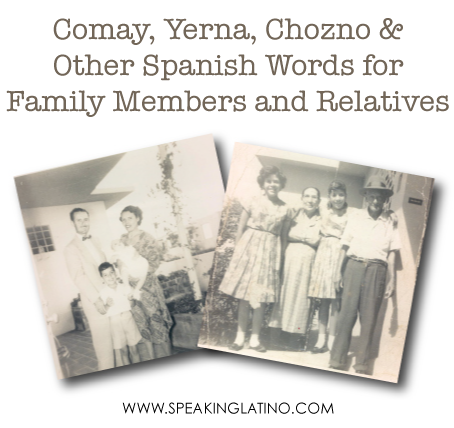
As you learn a language, one of the major tasks is vocabulary acquisition. The more words you know, the better you communicate. Occasionally, you run across words that are not translatable, but for the most part words in one language have an equivalent in another.
In the process of acquiring more vocabulary you will notice that you often learn these words in related-topic groups. For instance, your recent ski-weekend helped you learn words for types of weather, winter clothing, hot foods, ski equipment, and probably a couple other word groupings.
Some groupings are just harder to learn than others. Two of the hardest for me, even after 15 years of constant Spanish immersion, are cuts of beef and types of fish (there’s a Puerto Rican genealogy and family tree transition coming, I promise). The beef problem comes from not knowing the cuts very well in English and also that the names change from country to country. I know I like filet mignon, a grilled boneless short rib, a juicy entraña (ten years of eating this and I still don’t know how this is different from churrasco), arrachera, or a tasty bife de chorizo (which, as far as I can tell, actually has no chorizo involved). But don’t even ask me how to say any of those in the opposite language. Ain’t gonna happen.
With fish, my problem’s a bit different. There are so many names and so many different types of fish, I just get confused. Chapín, rodaballo and merluza for instance. And let’s not even get into the different words that Spain has for the various types of shrimp: gambas, camarones, carabineiros, etc. Yeah, yeah, I know…Puerto Rico family tree.
And now the third grouping that proved tricky for me turned out to be familial relationships. Brother-in-law, step-mother, niece, nephew, great-grandmother and on and on. The funnest to say, although not the most difficult to remember, has always been tatara-tatara-tatara-abuelo. But after several years I had mastered them all.
Then I arrived in Puerto Rico. And I heard yerna, primos hermanos, hermanos de crianza, hermanos de leche…
Infograhic: 12 Spanish Words for Family Members and Relatives
Scroll down for the text version

Share this infographic with a Tweet, a Like or a Pin!
12 Spanish Words for Family Members and Relatives I Learned in Puerto Rico
Here are the words I’ve run across so hopefully you won’t have to suffer through the same confusions.
1. compadre / comadre
Slang is compay / comay. Your childrens’ godfather or godmother, either from baptism or confirmation. Although compay exists for the male equivalent it is much less common.
2. primo hermano / prima hermana
Your cousins. Every other Spanish-speaking country uses primo but for some reason in Puerto Rico they use primo hermano instead. Primos segundo and primos terceros would then be your second and third cousins.
3. tío abuelo / tía abuela
Your grandfather’s brother or sister.
4. padrino / madrina
Godfather and godmother. Puerto Rican might have two sets of padrinos: the ones that Baptized as a child and the ones of your Confirmation.
5. hermano de crianza / hermana de crianza
Step-brother or foster brother.
6. hermano de leche / hermana de leche
This term comes from an older period when children were not always breast-fed by their mother. Often another woman would breast-feed the baby instead. So this is a brother that breast-fed from the same woman as you (not your mom).
7. cuñado / cuñada
This term is used for your brother or sister-in-law, however it differs in English in one important way. It does not refer to the spouse’s sibling of your sibling. It only refers to the persons directly related to your spouse. So your brother-in-law’s wife would not be your cuñada. Nor would his siblings be your in-laws.
8. concuñado / concuñada
The relation that your siblings and your wife’s siblings have.
9. chozno / chozna
Great-great-great grandson or granddaughter.
10. tío político / tía política (or any other “político”)
This means that you are related to the person by marriage. So, a tío político is an uncle by marriage.
11. consuegro
There is no equivalent in English. For you, these are your childrens’ in-laws. So the in-laws of your daughter are your consuegros.
12. yerna
Daughter-in-law. As mentioned before, this term does not exist in most countries. To say son-in-law the word is yerno, so intuitively you would expect yerna to be correct as well. Unfortunately, this is not true. Instead, most countries use nuera for daughter-in-law.
To learn more about the Spanish from Puerto Rico, search the Speaking Latino free online dictionary or check out my books Speaking Boricua: A Practical Guide to Puerto Rican Spanish and Speaking Phrases Boricua: A Collection of Wisdom and Sayings from Puerto Rico
.